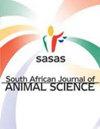养殖小鹿在饲养期间的行为取决于天气条件
IF 0.6
4区 农林科学
Q3 AGRICULTURE, DAIRY & ANIMAL SCIENCE
引用次数: 0
摘要
养殖的小鹿(Dama Dama)需要得到母亲的照顾和帮助,并受到包括同伴在内的其他个体的刺激。这有助于他们学会在群体中生活,在群体中建立自己的位置,获取食物,感知危险,生存,并开始繁殖行为。鹿饲养员对鹿的行为变化进行充分的分析有助于管理这些动物。此外,了解什么时候应该避免对动物自然行为的任何干扰,可能有助于改善它们的福利。该研究的目的是分析小鹿在饲养早期的行为和天气条件的影响。这些观测是在2017年7月和2018年进行的。小鹿最常在早上和晚上进行观察到的活动。仪式上的玩耍和喂奶比赛通常在晚上举行。随着气温的升高和湿度的降低,小鹿跟着母鹿,大声呼唤母鹿,可能是想说服母鹿躲到阴凉的地方去。随着空气温度和湿度的升高,哺乳频率增加,但哺乳时间随着空气温度的升高而缩短。风速越大,异乳现象发生的频率越高。研究表明,小鹿的自然行为对其在群体中的功能有影响,不应该在早上和晚上受到干扰。本文章由计算机程序翻译,如有差异,请以英文原文为准。
Behaviour of farmed fallow deer fawns in the rearing period depends on weather conditions
Farmed fallow deer (Dama dama) fawns need to receive care and help from their mothers and be stimulated by other individuals, including their peers. This helps them to learn to live in a group, establish their place in the herd, acquire food, perceive dangers, survive, and initiate reproductive behavior. Adequate analysis of changes in behaviour conducted by deer breeders can be helpful in management of the animals. Furthermore, the knowledge of the time when any disturbance in the natural behaviour of animals should be avoided may contribute to improvement of their welfare. The aim of the research was to analyse the behaviour of fawns in the early rearing period and the influence of weather conditions. The observations were conducted in July 2017 and 2018. The fawns most frequently performed the observed activities in the morning and evening. The ritual playing and suckling bouts were most often noted in the evening. With an increase in air temperature and a decrease in humidity, the young fallow deer followed the doe and vocalized to call the mother, probably to persuade her to hide in a shaded place. A higher frequency of suckling was noted at an increased air temperature and humidity, but the suckling time was reduced with the increasing air temperature. A greater wind speed was associated with a higher frequency of allosuckling. The study showed that the natural behaviour of fawns, which has an impact on their functioning in the herd, should not be disturbed in the morning and evening.
求助全文
通过发布文献求助,成功后即可免费获取论文全文。
去求助
来源期刊

South African Journal of Animal Science
农林科学-奶制品与动物科学
CiteScore
1.50
自引率
0.00%
发文量
39
审稿时长
>36 weeks
期刊介绍:
The South African Journal of Animal Science is an open access, peer-reviewed journal for
publication of original scientific articles and reviews in the field of animal science. The journal
publishes reports of research dealing with production of farmed animal species (cattle, sheep,
goats, pigs, horses, poultry and ostriches), as well as pertinent aspects of research on aquatic
and wildlife species. Disciplines covered nutrition, genetics, physiology, and production
systems. Systematic research on animal products, behaviour, and welfare are also invited.
Rigorous testing of well-specified hypotheses is expected.
 求助内容:
求助内容: 应助结果提醒方式:
应助结果提醒方式:


